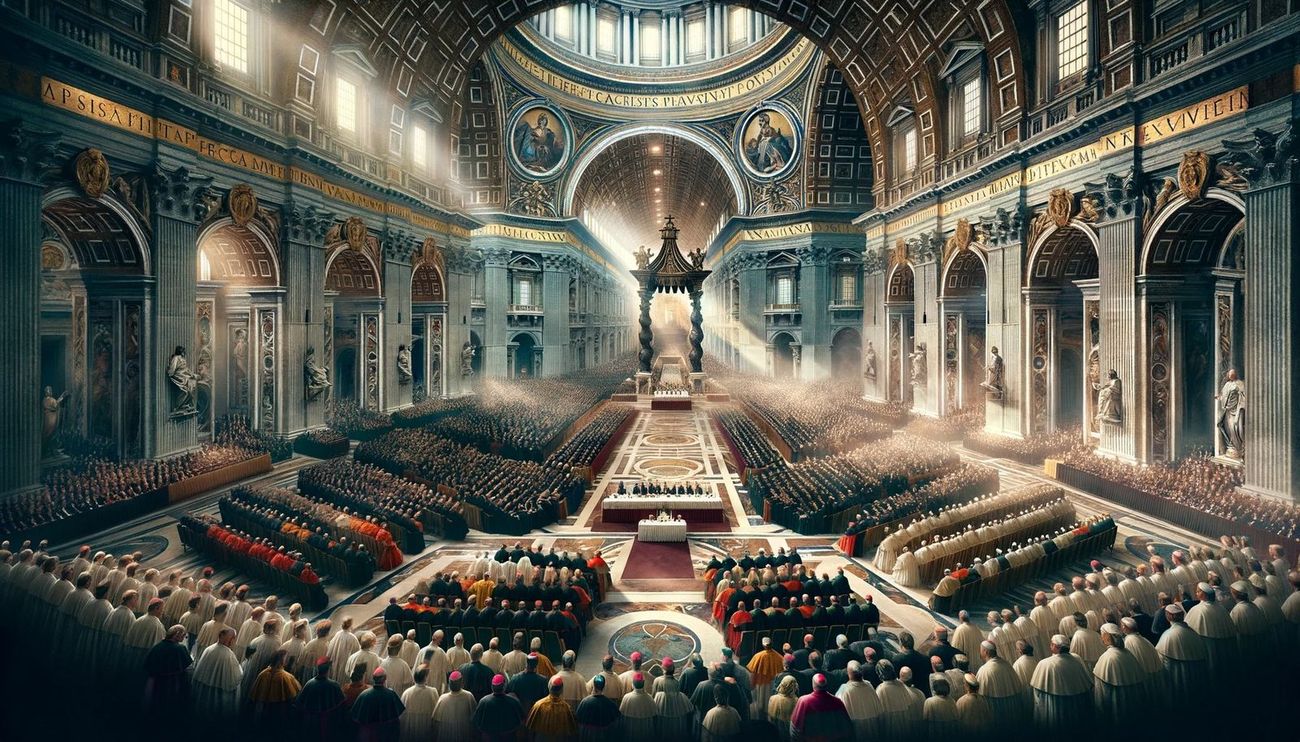Home>Theology and Spirituality>What Council Changed The Formula Of Baptism


Theology and Spirituality
What Council Changed The Formula Of Baptism
Published: March 2, 2024
Peter Smith, Editorial Director at Christian.net, combines deep insights into faith, politics, and culture to lead content creation that resonates widely. Awarded for his contributions to religious discourse, he previously headed a major organization for religious communicators, enhancing dialogue on faith's societal impacts.
Discover which council changed the formula of baptism and its impact on theology and spirituality. Explore the historical significance and theological implications.
(Many of the links in this article redirect to a specific reviewed product. Your purchase of these products through affiliate links helps to generate commission for Christian.net, at no extra cost. Learn more)
Table of Contents
Introduction
What council changed the formula of baptism? The history of baptism is deeply intertwined with the development of Christian doctrine and practice. Throughout the centuries, various councils have played a significant role in shaping the understanding and administration of this sacrament. From the early debates about the proper mode of baptism to the formulation of the baptismal liturgy, councils have left a lasting impact on the way Christians approach this rite. In this article, we will explore the influence of key councils, such as the Council of Nicaea, the Council of Trent, and the Second Vatican Council, on the formula of baptism. Understanding the decisions made by these councils is essential for comprehending the evolution of baptism within the Christian tradition.
Historical Background of Baptism
-
Early Christian Practices: In the early Christian era, baptism was primarily administered through immersion in water. This practice symbolized the cleansing of sins and the spiritual rebirth of the individual. The act of baptism was seen as a crucial step in the process of becoming a member of the Christian community.
-
Development of Baptismal Formulas: As Christianity spread, variations in the baptismal formula emerged. While some communities used the Trinitarian formula invoking the Father, Son, and Holy Spirit, others employed different expressions. This diversity led to theological debates and discussions about the proper wording to be used during baptism.
-
Emergence of Doctrinal Disputes: The question of the correct formula for baptism became a point of contention within the early Church. The debates centered on whether the Trinitarian formula should be universally adopted and whether deviations from it were acceptable. These discussions laid the groundwork for the involvement of councils in addressing the issue.
-
Influence of Jewish and Pagan Rituals: The practice of baptism also bore influences from Jewish purification rituals and certain pagan rites. These influences contributed to the evolving understanding of baptism within the context of Christian theology and spirituality.
-
Symbolism and Sacramental Significance: Over time, baptism came to be understood not only as a symbolic act but also as a sacrament with profound spiritual significance. The theological interpretations of baptism's meaning and its role in the life of a believer continued to evolve, prompting the need for doctrinal clarity and uniformity.
The historical background of baptism reveals the complex interplay of theological, cultural, and ritual elements that have shaped this sacrament throughout the history of Christianity. Understanding this background is crucial for comprehending the subsequent decisions made by councils regarding the formula and administration of baptism.
The Role of the Council of Nicaea
-
Establishment of Doctrinal Unity: The Council of Nicaea, convened in 325 AD, addressed the Arian controversy, a theological dispute concerning the nature of the Son in relation to the Father. The council sought to establish doctrinal unity within the Christian Church and affirm the divinity of Christ. In the context of baptism, the council's affirmation of the Son's equality with the Father had implications for the baptismal formula, emphasizing the Trinitarian understanding of God.
-
Formulation of the Nicene Creed: One of the most significant outcomes of the Council of Nicaea was the formulation of the Nicene Creed. This creed articulated the orthodox Christian belief in the Trinity, declaring the Father, Son, and Holy Spirit as co-eternal and of the same substance. The Nicene Creed's emphasis on the Trinitarian nature of God directly influenced the understanding and practice of baptism, as it provided a doctrinal foundation for the use of the Trinitarian formula in the administration of the sacrament.
-
Impact on Baptismal Practice: The Nicene Creed's proclamation of the Father, Son, and Holy Spirit as the object of Christian faith had a profound impact on the formulation of baptismal liturgy. The Trinitarian formula, as affirmed by the council, became increasingly standardized within the Church, guiding the language and structure of baptismal rites. This standardization reflected the council's efforts to promote doctrinal consistency and combat theological deviations, including those related to baptism.
-
Legacy of Nicene Influence: The Council of Nicaea's influence extended beyond its immediate historical context, shaping the theological framework of the Christian Church for centuries to come. The Nicene Creed, with its affirmation of the Trinitarian formula, became a cornerstone of Christian orthodoxy and significantly influenced the development of baptismal theology and practice. The council's role in solidifying the Trinitarian understanding of God's nature reverberated through the subsequent theological discussions and decisions concerning baptism, leaving a lasting imprint on the Church's approach to this sacrament.
The Council of Nicaea's impact on the formula of baptism underscores the interconnectedness of doctrinal affirmations and liturgical practices within the Christian tradition. The council's contributions to the articulation of Trinitarian theology and the formulation of the Nicene Creed significantly influenced the understanding and administration of baptism, shaping the course of Christian sacramental life.
The Council of Trent and Baptism
-
Doctrinal Clarity and Reform: The Council of Trent, convened between 1545 and 1563, marked a pivotal moment in the history of the Catholic Church, addressing doctrinal issues and initiating reforms. In the context of baptism, the council sought to clarify and reaffirm the Church's teachings on this sacrament, particularly in response to the theological challenges posed by the Protestant Reformation. The council's discussions on baptism aimed to uphold the sacrament's significance and address any deviations from established doctrine and practice.
-
Formulation of Decrees: The Council of Trent issued decrees specifically addressing the sacrament of baptism, emphasizing its necessity for salvation and its efficacy in the remission of sins. The council's decrees underscored the importance of proper administration and the use of the Trinitarian formula, affirming the Father, Son, and Holy Spirit. These decrees aimed to counteract any erroneous teachings or practices that had emerged in relation to baptism, reaffirming the Church's authority in regulating the sacraments.
-
Doctrinal Emphasis on Original Sin: The Council of Trent's discussions on baptism also focused on the Church's teachings regarding original sin and its implications for the sacrament. The council affirmed the doctrine of original sin, emphasizing the role of baptism in cleansing individuals from this inherited condition and initiating them into the life of grace. This doctrinal emphasis underscored the sacrament's role in addressing the spiritual consequences of original sin and its significance in the process of salvation.
-
Liturgical Standardization: In addition to its doctrinal pronouncements, the Council of Trent sought to standardize the liturgical aspects of baptism, including the use of specific prayers and rituals. The council's efforts aimed to ensure uniformity in the administration of the sacrament, emphasizing the need for reverence and solemnity in its celebration. This emphasis on liturgical standardization reflected the council's broader agenda of promoting unity and orthodoxy within the Church's sacramental practices.
-
Impact on Catholic Doctrine and Practice: The Council of Trent's decrees on baptism had a lasting impact on Catholic doctrine and practice, shaping the Church's approach to this sacrament in the centuries that followed. The council's reaffirmation of the Trinitarian formula, its emphasis on the sacrament's salvific nature, and its directives regarding liturgical norms contributed to the consolidation of Catholic teachings on baptism. These decrees also served as a response to the theological challenges of the Reformation, asserting the Church's authority in matters of faith and practice.
The Council of Trent's deliberations on baptism reflected its broader commitment to doctrinal clarity, pastoral reform, and the preservation of Catholic teachings in the face of theological and ecclesial challenges. The council's decrees on baptism contributed to the ongoing development of Catholic sacramental theology and underscored the sacrament's central role in the life of the Church and its members.
The Impact of the Second Vatican Council
-
Liturgical Renewal: The Second Vatican Council, convened from 1962 to 1965, initiated a comprehensive renewal of the liturgical life of the Catholic Church. This renewal had a profound impact on the celebration of the sacraments, including baptism. The council's Constitution on the Sacred Liturgy, Sacrosanctum Concilium, emphasized the active participation of the faithful in the liturgical rites, calling for a more profound engagement with the sacramental mysteries. In the context of baptism, this emphasis on active participation led to a reinvigoration of the baptismal liturgy, encouraging the meaningful involvement of the entire community in the sacramental celebration.
-
Theological Emphasis on Baptism: The Second Vatican Council reaffirmed the theological significance of baptism within the life of the Church. The council's teachings underscored the sacrament's role as the gateway to the Christian life, emphasizing its incorporation of individuals into the Body of Christ and the community of believers. This renewed theological emphasis highlighted the communal dimension of baptism, emphasizing the Church's responsibility in nurturing and supporting those who receive the sacrament. The council's teachings on baptism reflected a deeper appreciation for its ecclesial and communal dimensions, shaping the understanding of baptism within the post-conciliar Church.
-
Ecumenical Dialogue and Baptism: The Second Vatican Council's commitment to ecumenism and dialogue with other Christian traditions had implications for the Church's teachings on baptism. The council's openness to engaging with other Christian communities led to a reevaluation of the Church's relationship with non-Catholic traditions regarding baptism. The council's teachings emphasized the recognition of valid baptism administered in other Christian denominations, fostering greater unity and understanding among diverse Christian communities. This ecumenical approach to baptism reflected the council's vision of promoting Christian unity and reconciliation.
-
Pastoral Adaptations and Baptismal Rites: In response to the directives of the Second Vatican Council, the Catholic Church undertook pastoral adaptations in the administration of the sacraments, including baptism. These adaptations aimed to make the sacramental rites more accessible, understandable, and relevant to the contemporary faithful. The council's emphasis on inculturation and pastoral sensitivity influenced the development of baptismal rituals, encouraging the integration of local customs and languages into the celebration of the sacrament. This pastoral approach sought to ensure that the sacramental experience resonated with the lived realities of the faithful, fostering a deeper appreciation for the sacrament of baptism.
-
Continued Relevance and Influence: The impact of the Second Vatican Council on the understanding and practice of baptism continues to resonate within the Catholic Church. The council's teachings and directives regarding baptism have contributed to ongoing theological reflections, pastoral adaptations, and liturgical developments. The council's vision of a renewed and dynamically engaged Church has shaped the contemporary approach to baptism, emphasizing its communal, ecclesial, and transformative dimensions. The enduring influence of the council's teachings underscores the ongoing relevance of its insights into the sacramental life of the Church.
The Second Vatican Council's impact on the formula of baptism reflects its broader commitment to liturgical renewal, theological enrichment, ecumenical engagement, pastoral adaptation, and the ongoing vitality of the Church's sacramental life. The council's teachings on baptism continue to inform and inspire the contemporary understanding and celebration of this foundational sacrament within the Catholic tradition.
Conclusion
The evolution of the formula of baptism has been shaped by the deliberations and decisions of key councils in the history of Christianity. From the doctrinal affirmations of the Council of Nicaea to the pastoral reforms of the Second Vatican Council, these gatherings have left an indelible mark on the understanding and administration of this sacrament. The Trinitarian formula, affirmed and emphasized by the Council of Nicaea and reaffirmed by subsequent councils, continues to hold a central place in the liturgical practice of baptism within the Christian tradition. The Council of Trent's decrees on baptism underscored the sacrament's salvific nature and its significance in the life of the Church, while the Second Vatican Council's teachings renewed the communal and ecclesial dimensions of baptism, fostering a deeper appreciation for its transformative power. As the Church continues to engage with the challenges and opportunities of the contemporary world, the insights and directives of these councils provide a foundation for the ongoing vitality and relevance of the sacrament of baptism within the life of the faithful.














